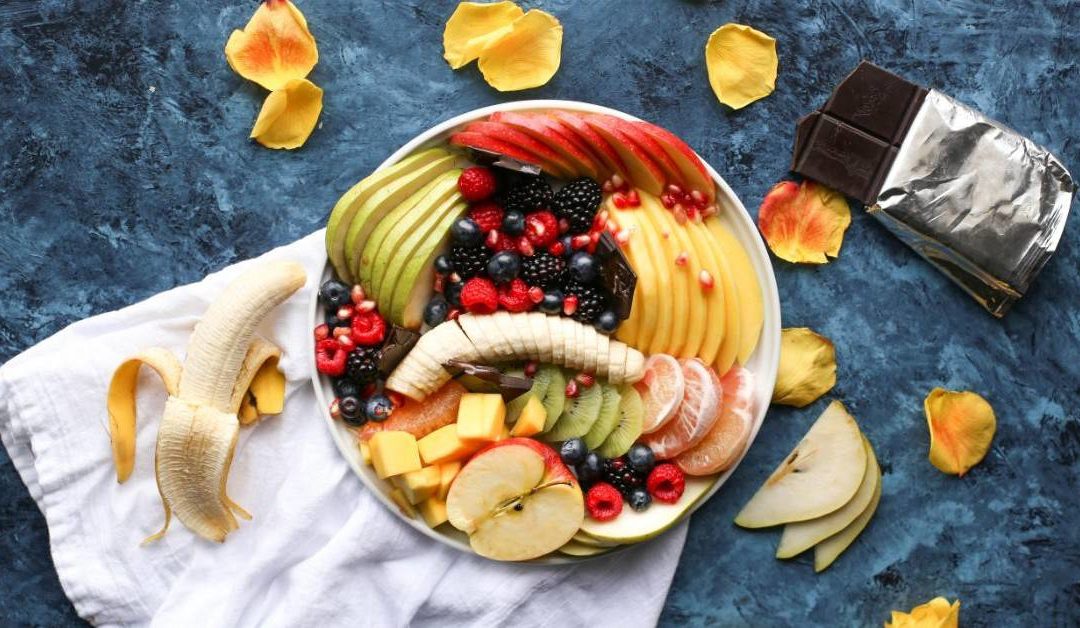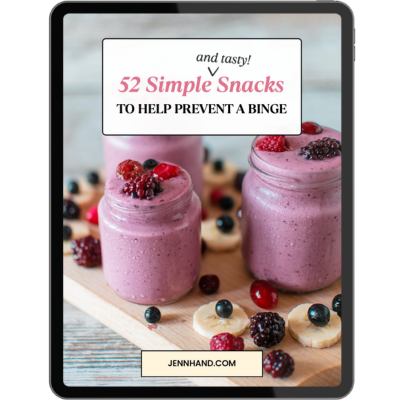When we’ve been in the diet world for some time, our brains become trained to think of food as good and bad.
Broccoli? Good
Cake? Bad
Salad? Good
Bread? Bad
When we’re working to stop dieting, it can be insanely challenging to train our brains to stop defaulting into thinking of food as good and bad.
Here are 3 tips to help:
1. Explore using different words.
The way we phrase something can make a big difference in how we feel about it.
If you say, “I can’t believe I ate bread and butter, it’s so bad”, it immediately makes you feel bad about yourself!
So instead of “good” and “bad”, see if you can use any of the following:
- Nourishing
- Balancing
- Energizing
- Nutritious
- Nurturing
- Sustaining
- Healthful
Thinking in terms of “good and bad” only makes us feel terrible about ourselves and our eating habits.
It keeps us stuck in that “all or nothing” mindset and makes us think we’re failures for being bad.
The list of words don’t have as much “baggage” as good and bad. They feel softer and more descriptive instead of judgmental.
So instead of 2 pieces of cake being “bad” for you, can you reframe it to say “it isn’t as energizing or satisfying to eat 2 pieces of cake for dinner”?
A ripe tomato and mozzarella salad may feel more balancing than ice cream.
Your mom’s homemade mac and cheese may taste more satisfying than a boxed version.
A turkey sandwich may feel more sustaining then a salad for lunch.
2. Get curious about what is working for YOU.
Carbs may feel energizing to you and heavy to someone else.
Caffeine may make you jittery but keep someone else alert.
Sugar may feel fine for you in moderation but to someone else it spikes their blood sugar too fast.
There is no right or wrong.
There’s just what works or doesn’t work for YOU and your body.
3. Think of it as a re-learning process.
When you stop dieting, you begin the process of thinking about food in a new way.
The old way of counting, weighing, measuring, and labeling doesn’t work for us.
So we explore a new way of being with food.
This is a process of unlearning that’s not black and white.
We’re not just machines and eat only kale smoothies and salads.
Food is complex. And so is our relationship to it.
You are on this path, so be gentle with yourself as you “un-learn” that this is good and that is bad.
You’re not only unlearning all the stuff that doesn’t serve you, but you’re re-learning what DOES!
That may take a minute 🙂
So see if when you default back into the “oh that’s good, I should have that food”, catch yourself and reframe it!
This builds a new habit and a new muscle around how you see food.
If you’d like more support on how to make food decisions, check out the training here.







We have been taught by the diet industry to see food as good and bad, we now need to unlearn and then relearn.
I ate Dairy Queen the other day. It was a warm summer night. I was by myself in my car. I ate strawberry with whip cream. It was delicious! Every bite brought delight! And as I was relishing the deliciousness, the usual thought,
“I shouldn’t be eating this” entered my head –Will that thought ever go away?!– followed by the thought, “this is so amazingly delicious; I need this and can’t live without out it! And so began the inner conflict. Thoughts like, “how are you going to lose weight if you keep eating sugar? yada yada yada… As I dealt with the slew of self imposed rules and judgements of myself and the food, I decided afterwards that Dairy Queen wasn’t “bad” and I noticed that I felt energized and satisfied after eating it because I had had a nutritious dinner beforehand. I decided that just like everything else, Dairy Queen has a place in my life.
Hi Jenn,
I, (along with a whole generation of people), am now aware that all sorts of fat is good, nutritious and essential for us!!
Fats in the 80s and 90s was vilified.
I believed what I was told 😔
In the last two years (with your help, blogs, emails, book and wisdom), l have reintroduced;
Eggs,
Cheese,
Full fat Greek yogurt, all full fat yogurts,
Butter,
Cream,
Oils,
Nuts
Etc the list goes on.
I hadn’t eaten hardly any of the above for 20 years😔
Boy do I like eating cheese and yogurts…now knowing they are superfoods, joyfully nutritious.
I know they do my body good😀
And finally, lo and behold…I haven’t put on weight because of them.
You have helped me to view food as nutritious, energizing but also recognise the foods that can make me feel sluggish.
Thank you
Exactly! It’s an unlearning and relearning 🙂
I love your awareness through this process! DQ isn’t good or bad–isn’t just how YOU feel about it 🙂 And yes…those thoughts get quieter and quieter as you keep moving forward in this process, I promise!
Oania, this is so beautiful! What a gift to be able to eat those foods again and begin to trust yourself along the way 🙂
I really want to explore the using different words tip instead of just using good and bad. It seems so simple but I think this will totally change my mindset around foods that I deem “bad”. Thanks Jenn!
You’re so welcome! Lots of brain retraining:)